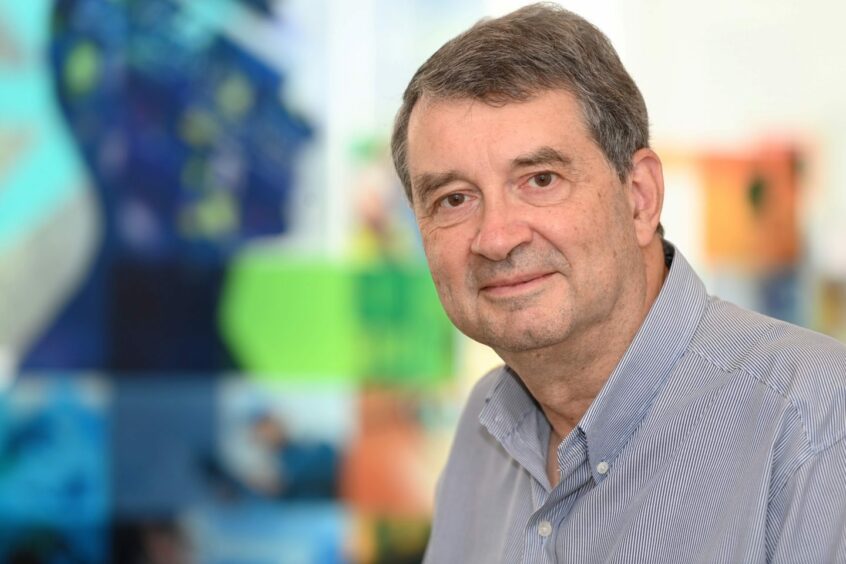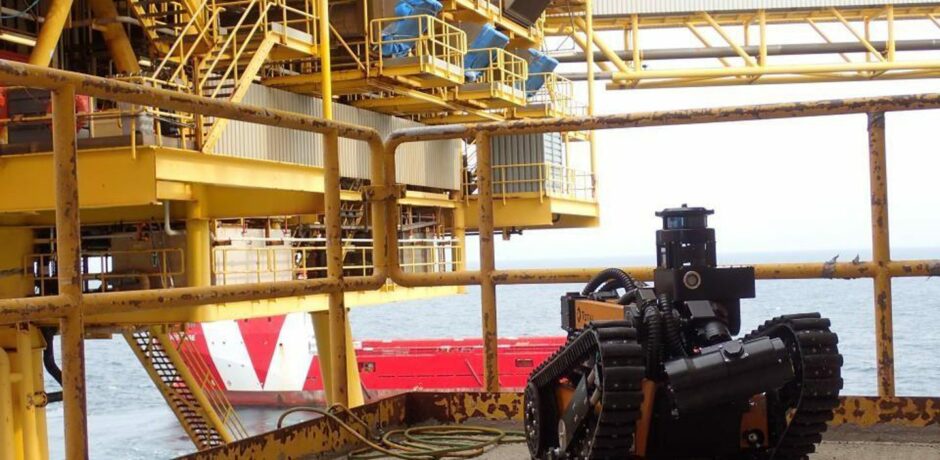
Interesting as it is to ponder flying or subsea drones, or even walking past a robot on an offshore platform, the future of the North Sea is just as much about strides in data and digitalisation.
However there are some areas where we can expect an increased presence from our mechanical counterparts.
The “three Ds”, as Steve Roberts, head of Offshore 4.0 at the Net Zero Technology Centre (NZTC), puts it, is where to look.
“Where I see the biggest changes coming… think there’s great opportunity to try to digitise and use robots and remote operations to carry out all our inspections and some of the maintenance programmes.
“We’re trying to develop and extend the ability of robots to work offshore to carry out some of those maintenance and certainly inspection tasks, particularly in hazardous environments, subsea, etc., so that we don’t have to put humans in those dangerous positions.
“The three Ds: we’re trying to automate are the dirty, the dangerous and dull tasks to enable humans to focus on where they best add value.”
Robotics is one of the areas the NZTC is focusing on, which includes robotics in the air – beyond line-of-sight drones which can carry out maintenance tasks.
Below the surface, drones can be developed to carry out tasks such as welding and inspections, and then there are robots on platforms where operators like TotalEnergies, working with the NZTC, have carried out trials in the North Sea.
Operators are keen to see such concepts demonstrated in operation offshore, overcoming the hurdles associated with that, Roberts reports.
“We’ve had robots from various companies allowed offshore to try takss, so we set them a test path around an offshore platform to see if they can cope with that in the conditions.
“A robots will need to be able to work in the harsh – back to the three Ds – dirty conditions, sometimes slippy conditions and they they’ve got work repeatedly and reliably before industry would take them up, so I think these tests are important to demonstrate that.”
Workforce
The rise of automation, robotics and digitisation has however, brought concerns in some areas about the impact of the workforce.
Pre-pandemic, experts at Robert Gordon University and skills body Opito said that thousands would need to be attracted into the industry in coming years, many in roles that do not currently exist.
Roberts envisions an “evolution” of the workforce, with an acknowledgement that attracting the next generation means the industry must get used to new ways of working.
“It’s about creating new skills and new jobs. It’s a mix of upskilling current workers by providing digital technologies that they can use in their in their jobs to be more efficient.
“For example, operating robots here remotely will be a relatively new skill for the industry, particularly asking in them complete more challenging tasks.
“I just think there’s a transition towards hybrid and a lot of upskilling needs to go on. So we’re collaborating with groups that will actually help in training and improving the digital skills of the workforce.
“And it’s another driver to attract the next generation of talent; we will need to operate in this way, because that that’s what’s on offer from other industries.
“They can come into other industries and operate in a digital fashion, so to be competitive we should be operating our energy assets in the same way.”
Net Zero – it’s in the name
Net zero being the centre’s raison d’etre, the road to digitalisation will help unlock the “big prize” of more efficient ways of working and integrating new, cleaner energies with oil and gas.
One area the centre is focused on is sharing of data to “illuminate” ways to drive efficiency and cut emissions across different offshore installations.
“I’ll give you example: I bought a home smart thermostat. Which is fine. I get a monthly report that tells me how I’m doing compared to my neighbours.
“Now it doesn’t tell me ‘oh your home is heated half a degree less than your neighbour’s’. I don’t know who my neighbours are or how their house size compares to mine, so there’s no standards there, but what it has driven is a behavior change.
“I’ve now got that amalgamated data giving me information and helping me keep track of where I am and maybe encouraging me to beat that target next time.
“I think the same applies for emissions reduction. If we can pull our data and see where we all are in a normalised fashion then that will help change and create focus.”
Data can also help unlock opportunities like offshore wind powering platforms – reducing the amount of time they run on polluting diesel generators.
Sharing is caring
Digital technology has “completely transformed other industries” and that same potential lies in the energy sector, Roberts says, “to the extent where, as an industry, we’re willing to embrace it and move it forward”.
Part of that is persuading industry to share that data, however.
An area the NZTC is focused on for creating a “data trust” to create improved trends and insights across the UK North Sea.
A difficult task in a competitive business industry?
“When I look at oil and gas, the only time we compete is when we’re competing for licence.
“Once we got our licence, the future is secure and then collaborate in partnerships and share the risk.
“So actually I would challenge (that). Once we’ve got that established here, are we really competitive?
“We don’t set our price, that’s set by the world market. So I think we are perhaps a more collaborative industry than we realize, and that we perhaps need to get over that data should be protected and maybe data should be actually shared for industry’s greater benefit.”
Recommended for you


 © Supplied by DC Thomson/ Darrell
© Supplied by DC Thomson/ Darrell © Supplied by TotalEnergies
© Supplied by TotalEnergies